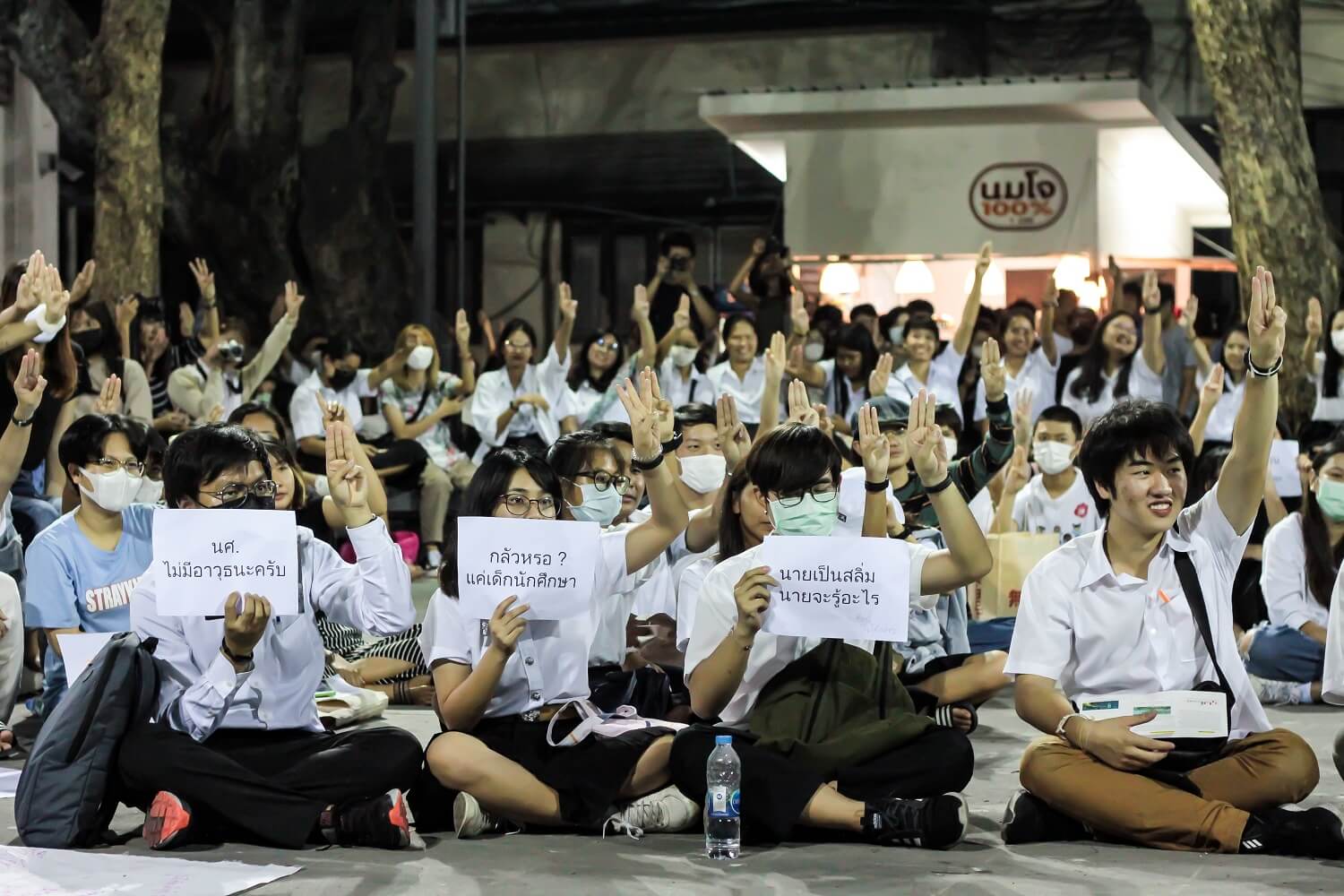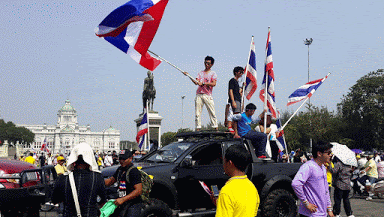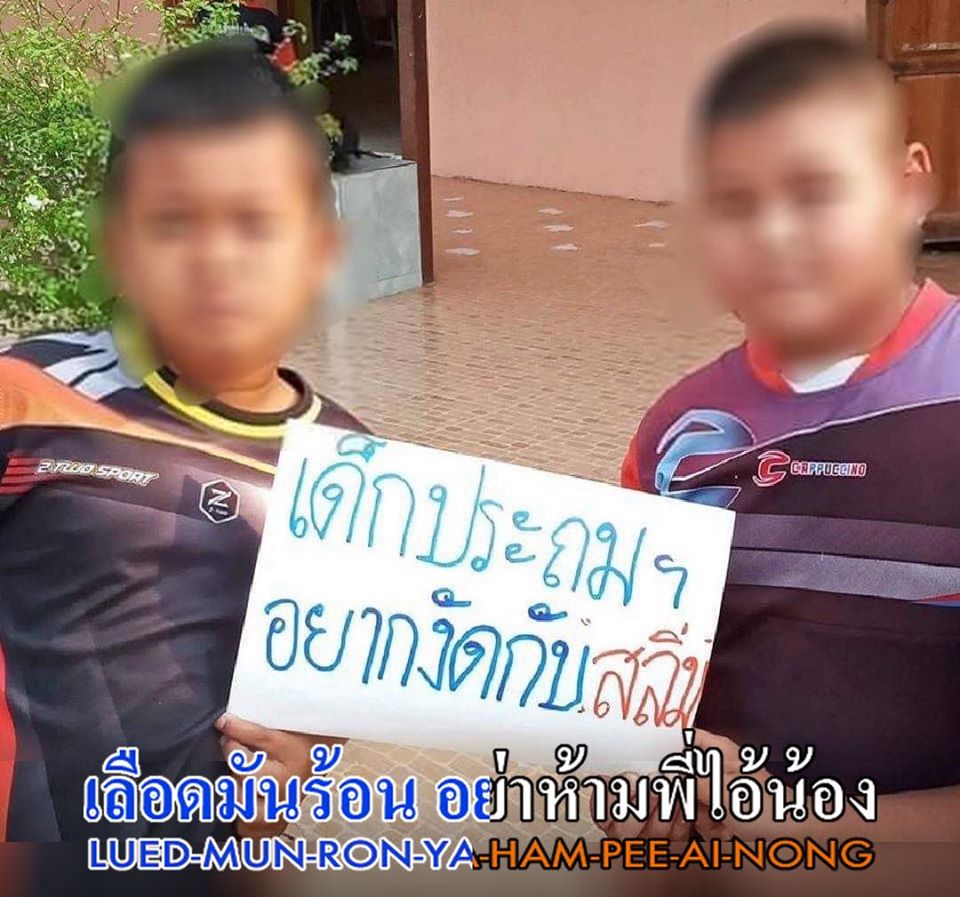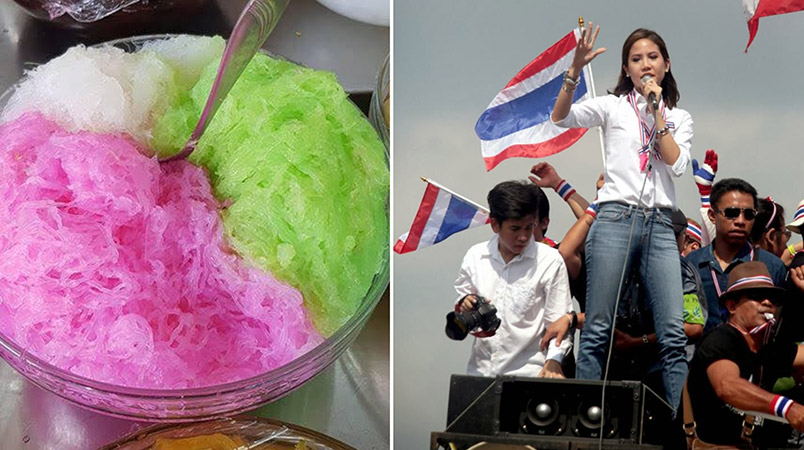“You are salim!” the man hissed, with something between a sneer and smile. The target of this slander? An old schoolmate who, six years ago, was among those painting Thai flags on their cheeks and denouncing the democratically elected government to all their Instagram followers.
The schoolmate wasn’t the only one with military lineage and an I’m-important “Na Ayudhaya” tacked onto their name at the recent hi-so wedding. Like most of the 30-somethings there, he’s unhappy with how things have turned out six years after they helped engineer a coup by blowing whistles and “shutting down” Bangkok.
But he was also unhappy to be called “salim,” even in jest, a term which online and off has become the go-to insult: an ultraconservative/ultraroyalist. The term has been around for awhile but has become hot slander since molten rage erupted among those who’d pinned hope on a progressive political party disbanded two weeks ago.
What is salim? Salim is a dessert made from mung bean noodles served in a bowl of coconut milk, syrup and crushed ice.
Importantly, salim comes in many colors, and its journey from sweet to sobriquet begins with the color-coded political fracture following the 2006 coup. For just over a decade, the populace was divided between Redshirts and Yellowshirts. Though they defy easy demographic shorthand, the Reds rallied behind ousted populist PM Thaksin Shinawatra and were generally more pro-democratic.

The Yellows generally represented the urban bourgeoisie and moved to roll back the clock to preserve the old-guard, military-royalist power structure.
Redshirts insulted Yellowshirts as malaengsaab (cockroaches) who refused to die. Yellowshirts called them khwai daeng (red buffaloes) for the animal’s cultural reputation as stupid.
That conflict reached a bloody head 10 years ago with Redshirts occupied a large swath of downtown until the government of Abhisit Vejjajiva deployed the troops in a bloody crackdown that left bullet-ridden bodies lying in some very fashionable streets.
ม๊อบคึก ผนึกกำลัง 2 สถาบันจุฬา+ธรรมศาสตร์ ประกาศเป็นเจ้าภาพฝ่ายบุ๋นเวทีกปปส.แยกปทุมวัน เปิดฝ่ายบู้ปทุมวัน+อุเทนถวาย pic.twitter.com/T2uXgJ7SZT
— jasky (@JaskyMCOT) January 13, 2014
Yingluck Shinawatra, Thaksin’s sister who came to power in a 2011 landslide, and the kingdom hummed along happily for a couple years until an amnesty plan hatched to heal wounds following 2010’s violence became a stalking horse for Thaksin’s return to the kingdom.
That was anathema to the Yellowshirt elite who’d pinched their noses but gone along with Yingluck’s steady leadership – it helped that the economy grew over 7% during the single full year of her leadership not marred by protests.
The amnesty bill was seized upon by her enemies, the drums began beating anew, corruption was on everyone’s lips, and the streets soon filled with skin-bleached Bangkok youth denouncing her in the ugliest misogynistic terms.
But by then the Yellowshirts had taken on an unsavory reputation and political operatives took up their mantle under a new guise.
Thus was born the “multi-colored movement.”
Its leaders posited it as above the old red-yellow divide, something representative of the “silent majority.” But no one really bought it when all the Yellowshirts from what had been the PAD (People’s Alliance for Democracy) signed onto the PCAD (People’s Committee for Absolute Democracy), aka the PDRC.
Same song, different chorus.

Enter those innocent, sweet noodles as a dismissive pejorative for people today, much as “dinosaur” became a post-2014-coup catch-all for the older generation whose cultural and political views remain locked in the past.
Today’s crop of young Future Forward supporters, who don’t see themselves beholden to colored shirts, saw a way forward for the country in Future Forward and its charismatic 41-year-old leader, Thanathorn Juangroongruangkit. They showed up to vote last year in the first election since 2014’s coup and handed it the third-highest number of votes.
Then the establishment moved to prevent Thanathorn from taking his seat before dissolving his party altogether, which struck many like a bad rerun.
That rage has since turned toward those deemed salim, the enablers of military and old-guard domination who’ve steered the nation into deeper corruption, nepotism, economic malaise, totalitarianism, unbreathable air, unaccountability, and mismanaged crises, to name a few.
Meanwhile salim has become a catch-all for a widening array of unsavory qualities. It’s also come back to haunt those who haven’t scrubbed their social media profiles of their pro-coup activism. People have been digging up old photos and tagging them salim on Twitter.
Not to mention the memes.
สลิ่ม Everywhere #saveซันนี่หาพ่อง pic.twitter.com/lir2z48di6
— ลิอะไรนะที่เป็นแฟนเรา ลิซ่าปะ (@FatherYou1) February 29, 2020
Y’all are salim, this meme has former opposition lawmaker Mingkwan Sangsuwan of the New Economics Party saying in parliament.

‘Primary school kids wanna fight salim,’ reads a post from popular meme page Underground Karaoke.
Arguing with สลิ่ม be like#1MDB#อภิปรายไม่ไว้วางใจนอกสภา pic.twitter.com/oiKLZapUER
— ⚔️ (@aslenticularis) February 23, 2020
Related:
No New Future: Court orders Thai opposition Future Forward Party dissolved




